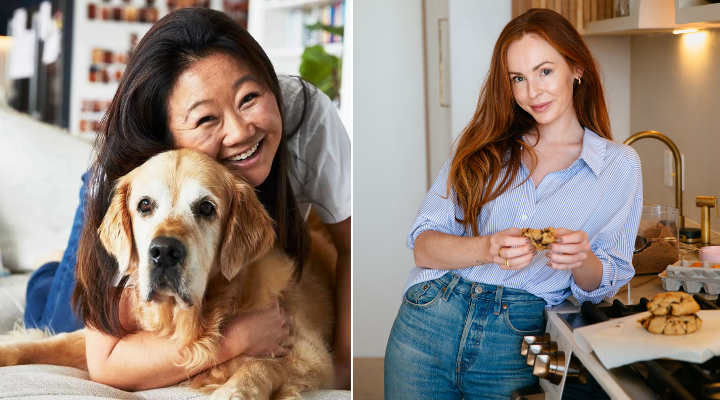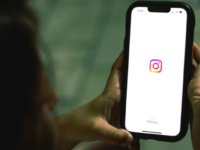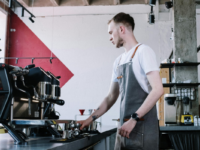If you’ve been keeping up with news this week, you will have seen the small-business stoush that’s making national headlines – namely, the plagiarism allegations levelled against Brooki Bakehouse‘s Brooke Bellamy by RecipeTin Eats founder Nagi Maehashi.
Maehashi alleged that Bellamy’s bestselling cookbook, Bake with Brooki, contained recipes plagiarised from other creators – including Maehashi’s own caramel slice and baklava.
The author and business owner published a statement that included screenshot comparisons of the recipes.
“The similarities are so extensive, dismissing it as a coincidence would be absurd (in my opinion),” said Maehashi in the statement.
Bellamy denied the allegations in an Instagram story on Wednesday night. In the statement, she claimed to have been making and selling her caramel slices since 2016 – four years before Maehashi’s caramel slice recipe was first published.
Bellamy then added a screenshot of an Instagram post from December 2016, which featured a photo of her caramel slices for sale. She did not provide the recipe she had used on that occasion.
The publisher of Bake with Brooki, Penguin Random House Australia, has also denied Maehashi’s allegations.
Can you copyright a recipe?
According to the Australian Copyright Council, copyright doesn’t protect recipe information like ingredients or cooking methods.
However, copyright law does kick in when the recipe is “recorded in some way”, according to the Council – in other words, it can protect the unique way that a recipe is written down. This means that Maehashi’s methods, ingredients, quantities, and timings aren’t necessarily protected by law, but her unique expressions might be.
The problem of IP “grey areas”
The RecipeTin Eats scenario illustrates a fundamental problem in the lack of IP protection available for many businesses.
As we move into a more service-based, informational economy, more and more products occupy the same space as Maehashi’s recipes. Services like branding, online courses, business models, and designs are difficult to shelter from plagiarism because their value lies in ideas – which aren’t covered by copyright.
As the Australian Copyright Council describes, “Copyright does not protect ideas or information, but rather the way ideas or information is expressed.”
This challenge is growing even more complicated with the rise of generative AI. With LLMs scraping the internet to generate content, it’s becoming increasingly difficult both to protect your own IP and to avoid accidentally infringing on others’. For more information, ISB spoke with an AI expert Leanne Shelton about how business owners can avoid accidental copyright infringement.
What can small-business owners do to protect their IP?
When it comes down to it, there is sometimes little you can do to fully prevent others from copying your IP. But that doesn’t mean you shouldn’t consider all the tools available to you, including engaging a qualified legal professional.
Know your legal protections
Depending on what your products and services are, there may be multiple options to protect your IP, as explained by Intellectual Property Australia:
Copyright: Copyright protects the expression of an idea. Unlike other IP protections, you don’t have to apply for these.
Trademarks: Identify your unique brands, products and services
Patents: Cover inventions, and can be used to stop others from copying your innovations.
Registered designs: These cover the unique appearance of products and can be used to stop others from copying your designs.
Get legal protection before infringement occurs
ISB recently spoke to the founders of e-commerce start-up CMY Cubes, Gabi Saper and Lorenzo González. The founder duo recounted how another company had tried to trademark their products about a year after they had established the business. What followed was a lengthy legal battle.
Saper said that the trouble could have been avoided if the brand had trademarked early.
“If we had it from the beginning, we would just be like, ‘No, we’ve got it, and we’ve had it’,” she said.
If all else fails – build a loyal fanbase
Maehashi’s recipes – and buoyant, personable online presence – have transformed her into a beloved figure internationally.
Following her allegations against Bellamy, she received an outpouring of support from RecipeTin Eats fans.
“You are a strong and courageous woman – well done for speaking out,” said commenter Janet Fitzpatrick on Maehashi’s statement post.
“Nagi, you have my utmost support, along with everyone,” said another commentator going by the name of Kathryn. “This is awful, and I’m so sorry this is happening to you and other authors.”
The torrent of online support proves the importance of customer loyalty in a world where small businesses often receive little recourse for an alleged IP infringement.
Maehashi said she can’t speak about potential legal action against Penguin Random House and Bellamy. But when it comes to reputation, she certainly seems to have won over the court of public opinion.
This article is for general informational purposes only and does not constitute legal advice. For advice specific to your situation, please consult a qualified legal professional.















